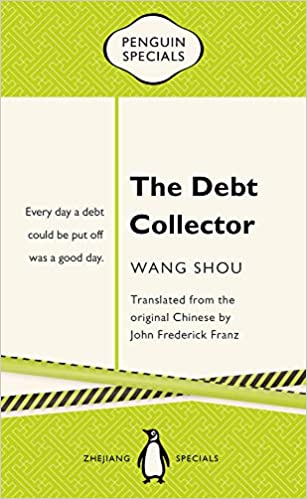The Debt Collector, by Wang Shou
translated by John Frederick Franz
Penguin Classics, 2020
Publisher's Blurb
There was one thing that Chen Sheng knew for certain--the only person who could help him was Zhang Guoliang. As his former boss, Chen Sheng would simply ask him to enter the house of a businessman who owed him money and request the full sum. It was not extortion, it was not a robbery, it was just debt-collection. At least that's what Chen Sheng told himself until he opened the Rezhou Informer the very morning after the plan's execution. The front page of the paper told a different story, and there was no one else Chen Sheng could call on now.
Reading Chinese Network Reviews
Reviewed by Riya Shah, 25/8/21
 Wang Shou in his novella The Debt Collector weaves a thrilling tale centring around a moderately successful businessman named Chen Sheng who was “mostly satisfied with his business” but whose only vice was that he extended credit too easily.
Wang Shou in his novella The Debt Collector weaves a thrilling tale centring around a moderately successful businessman named Chen Sheng who was “mostly satisfied with his business” but whose only vice was that he extended credit too easily.
As the story progresses, the readers see that this habit turned out to be very expensive to him and his business. Long Haisheng was the rich, powerful owner of the Feida Shoe Company whose debt reached to 300,000 yuan. After exhausting all possible ways of getting his money back, finally Chen resorted to intimidation as it seemed to be the only feasible option of getting money back from the Feida boss who was “devoid of any conscience”.
Chen comes up with a plan which involved a hardworking Jiangxi villager named Zhang Guoliang. Chen hired Zhang to intimidate Long, just to intimidate and not harm. The plan was simple, it was not extortion, it was not a robbery, it was just debt-collection. But as fate would have it, the plan was not that ‘simple’. The duo staked out Long’s housing complex for two days and Chen made sure that Zhang had all the details. To prepare him mentally, Chen told Zhang to “forget about human kindness with them, since they really don’t have any principles.” Here, we see a different side of Chen. Earlier portrayed as the hapless victim, now Chen becomes the perpetuator of fear.
Next, Wang Shou sets into motion a nail-biting house arrest scene where Zhang has explosives strapped to his chest and is seen bossing around the rich masters. Though, the police shot him down at the end, we don’t know how they were informed about the hostage stand-off. A lot of questions remain unanswered which creates a sort of unfulfilling experience but at the same time this lack of transparency is representative of the actual socio-economic realities. The interactions between the three characters -- Chen, Zhang and Long -- also show the socioeconomic divide prevalent in the urban and rural areas. Wang Shou has done an excellent job in portraying these slight nuances which shape the characters’ realities and sets them apart from one another.
At the end, we see that Chen feels morally indebted to Zhang Guoliang for his sacrifice. The Rezhou Informer published an article with a grim looking photograph of Zhang Guoliang which stirs something up inside Chen and he decides to sell his business and leave Rezhou. Chen’s wife interjected at this decision but Chen paid no heed. He moves to Le’an to take care of Zhang’s elderly father and the story ends with him receiving divorce papers which he dejectedly accepts. “I am the one who was wrong, so it is only fair that I should walk away from our marriage empty-handed…” The story culminates on a sombre tone after cresting up and down throughout the course of the novella. Wang Shou’s stream of consciousness style writing is a perfect narrative mode which depicts the multitudinous thoughts, feelings and motives of the characters. The riveting, fast-paced tone makes “The Debt Collector” a thrilling read that one just cannot put down.
Reviewed by Riya Shah
Reviewed by Kevin McGeary, 28/7/21
 An alleged decline in public morals is a contentious issue in China. At the end of Chinese Lessons, a 2006 memoir and essay by John Pomfret, the Washington Post correspondent, concludes that, while China has been on a great run since 1989, the ‘vacuum in everyday morality hampers everything’. In recent years, this shortage of public morals has manifested itself in the melamine in baby milk powder scandal of 2008, and the use of gutter oil in cooking for customers.
An alleged decline in public morals is a contentious issue in China. At the end of Chinese Lessons, a 2006 memoir and essay by John Pomfret, the Washington Post correspondent, concludes that, while China has been on a great run since 1989, the ‘vacuum in everyday morality hampers everything’. In recent years, this shortage of public morals has manifested itself in the melamine in baby milk powder scandal of 2008, and the use of gutter oil in cooking for customers.
Chen Sheng, the protagonist of Wang Shou’s The Debt Collector, is a moderately successful businessman whose heroic flaw is that he extends credit too easily. With the help of his less worldly associate Zhang Guoliang, Chen attempts to collect some money that is owed to him. He tries to have the money collected ethically, but the law is not on his side.
The tactic Chen and Zhang resort to is one of intimidation, but not violence or harm. This puts his behaviour a cut above other businesspeople.
Despite his desire to do the right thing, unlike Zhang, Chen is fully aware of the typical commercial practices that are typical in the fictional city of Rezhou, where the novel is set:
Some of the men who ran businesses in Rezhou had a mysterious air about them. They all originally had connections with the underworld, carried machetes in their belts and swaggered when they walked. Having now grown older and wanting to put their roguishness behind them, they had established small factories as a means of supporting themselves. In reality, however, their business practices remained just as sketchy as ever. They were shysters and connivers to the core.
His antagonist Long Haisheng is more attuned to the culture of apathy that enables amoral people to get away with it. Chen observes: ‘Vicious and merciless people like him only knew how to lean on people, to swindle them, then kick them when they’re down.’
While Zhang Guoliang is slyly tortured by police in a way that doesn’t leave a mark, Chen and Zhang try to treat others as well as possible. To understand anything through the prism of money is to understand it very superficially.
In a country that has had a famine within living memory, materialism is understandable. However, certain cultural phenomena have shown how spirit-crushing this single-minded obsession can be. These include the expressions 房奴,house slave, and 车奴, car slave, that have entered common parlance.
The Debt Collector is a telling read. Wang Shou’s mastery of plot and prose style keep it ticking along, but there is a limit to how much enjoyment one can get from reading about ‘vicious and merciless’ people, who are stuck in their world.
Reviewed by Kevin McGeary
Reviewed by Stella Jiayue Zhu, 18/5/21
 Rezhou local and small business owner Chen Sheng has a debt to collect from powerful businessman Long Haisheng. Chen wants what he is owed, but he has exhausted all friendly options, yet Long remains a stubborn debtor. There is, for Chen, one last resort.
Rezhou local and small business owner Chen Sheng has a debt to collect from powerful businessman Long Haisheng. Chen wants what he is owed, but he has exhausted all friendly options, yet Long remains a stubborn debtor. There is, for Chen, one last resort.
Wang Shou’s novella The Debt Collector is the story of Chen’s last quest: what does he do? He enlists the help of a former employee, the hardworking country naïf Zhang Guoliang, whom Long has never met. Their plan is simple: Zhang will enter Long’s townhouse and scare him into surrendering the full amount. Scaring him. That is. Not harming him. They just want back what they deserve. What could go wrong? Everything.
Chen and Zhang are, as they believe themselves to be, fundamentally decent people. And that turns out to be their biggest character flaw. Their good-naturedness is rooted in their naivety; that is, in part, their ignorance about how wealth works and, in part, their misplaced trust in the power of the individual’s good will, which does not go very far in the world they inhabit. So, in ways not dissimilar to Don Quixote, they look like fools and trip like fools, becoming sources of sympathy and laughter.
As a tragicomedy, The Debt Collector is a clever tale with unexpected plot development at every turn of page. But the way Wang tells the tale is even more impressive, weaving together distinct narrative voices without pause, often sliding from one character’s interior speculation, to a third-person omniscient narration, then back to another character’s impression and observation all in a few pages. Often, it is even ambiguous when the transition occurs or if there really is such a precise moment.
The effect is twofold. On the one hand, it builds intensity, forcing us to experience the misfortunes of our protagonists as they do—in subjective time—which makes the down-spiraling cascade of events even more excruciating.
On the other hand, it creates opacity. Certain mysteries remain undisclosed till the very end. Long and his family are able to discretely inform the police while they are under Zhang’s watch. But when and how does it happen? Zhang is taken to be a dangerous robber and shot to death by the police. But why are the police so sure? We don’t know the answers. Chen doesn’t know either. It’s an ignorance he has to live with, and we do as well. In these moments, the opacity of the narrative mirrors the fractured experiences of its characters, who confront an institutionalized world operating with rules they don’t fully comprehend. Seen from this angle, The Debt Collector becomes much more than a mystery thriller. It is a commentary on wealth, justice, and social inequality.
Whilst the story itself has much to offer, I could not help but feel disappointed at the translation. Translator John F. Franz gets something right: the pace, for instance, which allows readers to feel the thrill of action with immediacy; the humor, as well, which preserves the story tonally.
But it also gets a shocking amount wrong, often in ways that change meanings and impede comprehension. Some are transfer errors at word level. For example, where Wang writes of inexperienced soldiers gagging/干呕 from nervousness right before a planned ambush, Franz’s translation says they ‘couldn’t keep from vomiting’ (73). Some are at sentence level. The saying that the coffins are already carried beyond Sanjiaomen/棺材都抬到三脚门外了 is erroneously rendered as ‘the coffins are only carried until Sanjiaomenwai’ (76). Some stem from misunderstandings of the Chinese culture. Where Wang gestures at a funeral ritual that involves distant relatives in attendance parting ways before the burial, Franz makes the mistake of suggesting that a coffin would be sent to the graveyard ‘on its own’ (75), which, I hope, should strike any reasonable reader as not just culturally unlikely, but physically impossible.
You may notice that my examples are all within a page or two from one another. This is because I am only able to access a partial copy of the original text. So, I must acknowledge the possibility of having happened upon a particularly thorny section that does not represent the translation’s overall quality. Yet, the sheer density of errors, the plain oddities they result in, and the fact that this made past editors and the publisher, are all very troubling. I will not go into more depth on the specifics here; but for the interested, you can read this analysis, where I pick one paragraph, and compare it with its counterpart in the original in detail.
The question naturally rises: is The Debt Collector worth reading? I lean, still, towards the affirmative. Though compromised by its translation, the story itself is truly original and originally told. It’s a page-turner from beginning to end. On this note, the book delivers exactly what its preamble claims: it ‘fills a gap’, as a pastime for when you are ‘stuck on a train’ or ‘between dinner and bedtime’. It just could have been more, in a better possible world.
Reviewed by Stella Jiayue Zhu
Reviewed by Rebecca Ehrenwirth, 6/4/20
 Compared to literature from English-, Spanish or German-speaking countries, literature from China is rarely translated. This is partly because literature from China is in a way less accessible for a “Western” audience; the translator has not only to translate the language but also the culture. However, with his novel The Debt Collector Wang Shou succeeded in creating a story that crosses cultural borders and is universally understood. He packs up his message in such an ironic and funny way that the reader will not want to put the book down.
Compared to literature from English-, Spanish or German-speaking countries, literature from China is rarely translated. This is partly because literature from China is in a way less accessible for a “Western” audience; the translator has not only to translate the language but also the culture. However, with his novel The Debt Collector Wang Shou succeeded in creating a story that crosses cultural borders and is universally understood. He packs up his message in such an ironic and funny way that the reader will not want to put the book down.
The protagonist of the novel is Chen Sheng, a businessman from Rezhou. On the first couple of pages Chen Sheng is described by the narrator as a good-natured man who “extended credit too easily”. The reader can already suspect that this will lead to problems for the businessman. And because Chen Sheng is so kind-hearted, with ordinary measures he cannot convince one of his buyers to pay his debts, because the man is “devoid of any conscience”. So, in order to get his money back, Chen Shou has to take extraordinary steps and he comes up with a plan, which involves another good-natured and rather naïve man who works for him, named Zhang Guoliang. In the following days, Chen Sheng spends a lot of time to win over Zhang Guoliang’s trust and his support in executing his “sophisticated” plan. But as it goes with all sophisticated and well-thought-out plans – they go wrong… This plan has to go wrong because of Zhang Guolinag’s naivety on the one hand and Chen Sheng’s bad luck on the other. Yet, as soon as the plan fails, luckily Chen Sheng comes up with yet another plan – which also fails. And just like in real life, in the end, the antihero, the immoral and corrupt buyer, defeats the two unfortunate and good-hearted men.
By shifting between an authorial narrative situation and Chen Sheng as well as Zhang Guoliang as reflectors of the story, the reader gets a unique insight into the thoughts and feelings of the protagonist and his accomplice. In particular in the end of the novel, the reader follows Chen Sheng’s thoughts in a stream-of-conscience like style. Not only this but also the metaphors and similes that Wang Shou uses, make his novel a delightful and entertaining read: “The sticks of dynamite were as thick as Rezhou’s speciality blood sausage, and were as long as those sausages as well. […] They looked powerful and frightening.”
The translator John Frederick Franz did an excellent job in capturing these amusing moments and transferring them into English without losing the author’s original voice. An amusing and sarcastic short novel which everyone should read.
Reviewed by Rebecca Ehrenwirth
